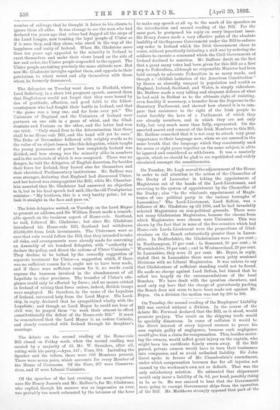On Tuesday, Mr. Legh moved the adjournment of the House
in order to call attention to the action of the Chancellor of the Duchy of Lancaster in taking the appointment of Magistrates oat of the bands of the Lord-Lieutenant, and reverting to the system of appointment by the Chancellor of the Duchy ; also "to the wholesale appointment of Magis- trates of one political party in the various boroughs of Lancashire." The Lord-Lieutenant, Lord Sefton, was a follower of Mr. Gladstone up till 1886, and he had invariably selected Magistrates on non-political grounds. There were not many Gladstonian Magistrates, because the classes from which Magistrates were chosen were Unionists. This was shown by the fact that in none of the five counties which had Home-rule Lords-Lieutenant were the proportions of Glad- stonians on the Bench substantially greater than in Lanca- shire. In Bedfordshire, the Gladstonians were 14 per cent.; in Northampton, 17 per cent. ; in Somerset, 20 per cent.; in Warwickshire, 10 per cent. ; and in Westmoreland, 28 per cent. In Lancashire, they were 21 per cent. Mr. Bryce, in reply, stated that in Lancashire there were seven petty sessional Divisions with no Liberal Magistrates. It was untrue to say that Gladstonians of sufficient standing could not be found. He made no charge against Lord Sefton, but hinted that he relied too largely on the recommendations of the local Benches. We have dealt with the question elsewhere, and need only say here that the charge of gratuitously packing the Bench does not seem to have been made out against Mr. Bryce. On a division the motion was lost by 260 to 186.


















































 Previous page
Previous page